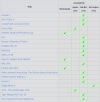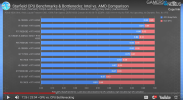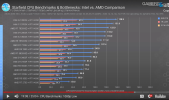I'm not sure comparing the performance of DDR to GDDR memory is quite accurate here. You're right that having large amount of memory even if split between two processors is still good especially with new optimizations to bridge the gap between the unified memory architecture on the consoles and the split system on PCs. But you get much higher memory bandwidth with GDDR memory and even lower latency with a unified memory architecture. So with bandwidth hungry tasks related to AI and RT you could see certain features not working well on licensed Xboxes or PCs in the first year or two until there is enough VRAM. But again this would only be shortlived for 1 or 2 years and only if my speculation about a more than 2x jump in memory turns out true.I think its a bit short sighted to only look at VRAM. today you can get 32gigs of ddr 5 ram for $80 bucks and a 8-20gig vram video card for the pc.
But the same was kinda true with the ps4/xbox one. They had 8 gigs total ram but most gamers ran 16-32 gigs of ddr 4 and video cards of 4-8gigs of ram.
I think on the pc side we have been just as stagnant as on the console side and it really started happening last gen. I also don't see a OEM stuffing their version of xbox full of expensive ram. Even then all that will happen is costs will go up on that console. If lets say Dell comes out with the alienware Xbox series X and puts in 32gigs of ram they aren't going to sell it for less than MS is selling the current xbox series x. They are going to say well this is a value add and now lets make money and price this at $600 or $700. not to mention that both MS and Sony are willing to eat some cost of consoles at the start because they get 15-30% of all the games sold and 100% of all the accessories. Dell wouldn't be getting any of that.
Yes its impressive, thanks for sharing. Seems like they glued together some good APIs. The magic is in how good the APIs are, I could write these code myself. Yes MS could even add advanced Retrieval Augmented Generation(RAGs) to add context and make the in game AI conversation even more reliable.Modders added AI to skyrim on their own and it didn't take them years
It seems to work really well and if they could do it then MS's dev teams can do it.
I meant relatively large AI accelerator. You'd need it for better inference for the gaming workloads. So more die area allocated to inference for ML workloads. This is going to be a trend moving forward. We'll see the same with the PS5 pro. It will have more die area allocated to PSSR and RT hw accelerators.I am not sure why you need a large AI accelerator. AMD has xillan cores that it is adding to Zen with Zen 5 later this year. They will be small cores meant to accelerate this stuff kinda like what Qualcomm is doing
In terms of bandwidth there is nothing stopping Ms from implementing infinity cache into the xbox or going with a split pool of ddr for the cpu and gddr for the gpu.
In terms of bandwidth there is nothing stopping Ms from implementing infinity cache into the xbox or going with a split pool of ddr for the cpu and gddr for the gpu.
For the bandwidth the infinity cache definitely improves on performance but empirical data has shown it has only marginal improvements. You'd get more bang for your buck with higher bandwidth GDDR memory. I remember Xbox One tried some sort of caching techniques and they actually didnt turn out well. They were compensating since they had gone with DDR3 RAM(Mama mia what a blunder) while Sony went with GDDR5. Also GPUs are much more parallel in nature than CPUs so things like cache coherency are more of a problem with CPUs. The Infinity Cache definitely offers some benefits but its not going to give you a generational leap. It will provide marginal improvements in performance. You'd get more bang for you buck by increasing cache size on the CPU die but thats expensive which is why you see console CPUs cut the cache sizes for their CPUs or omit things like infinity cache on the GPU. Dont judge me if I'm wrong, I last sat in Comp architecture class years ago. But splitting the memory would actually increase latency and make the console slower. With unified memory the processors both have access to the same physical memory addresses and this is much more efficient and faster. So they need to choose one type of memory for the whole system. And between DDR and GDDR the higher bandwidth type(GDDR) is better since it wont bottleneck the GPU as well more than meets the CPU's bandwidth requirements. The lower latency you could get from using DDR is offset by the shared physical memory addresses of unified GDDR memory. Its just a much much smarter more efficient more powerful memory system really. It would be a self own splitting the memory.
Yes launching earlier definitely gave them a headstart and was a huge reason as well for the success. You're absolutely right. BUT:Sure it being a better designed system may have helped it out later on but there is no denying that having the market to themselves as the only next gen machine for a year also helped them out.
As for 2025 you'd get zen 5 which leaks indicate in certain tasks is 40% faster than zen 4 which it self is faster than zen3+ and that is faster than zen 3 which is faster than zen 2 in the ps5/pro and xbox series there should be massive gains in cpu performance clock for clock. Depending on when Morpheus(zen 6) comes out that could even be possible for a 2025 console.
We know in some games the zen 2 processor in the ps5 and xbox series consoles is holding back frame rate and performance. The ps5 pro is rumored to only have a slight increase in clock speed of several hundred mhz . So in those types of games you could end up seeing huge gains in performance. That is before getting software specifically designed to take advantage of the new processor
On the gpu side if rdna 5 is available that should hopefully greatly improve ray tracing performance and that is something rdna 2 greatly lacks.
At the end of the day MS has 32 developer studios which can focus on making the best experiences with their console as a base. Things are completely different than when they launched the xbox series. For one there is no pandemic shutting everything down and forcing everyone remote. but also they have grown a lot in studios allowing them to have a lot of content for the xbox.
I've said it before and I will say it again. Having a COD that takes advantage of the next gen system on day one is a big system seller. There are a lot of cod fans that will switch consoles for the best console version. Add to it that they can have a gears ready or doom and have a big RPG ready too and it could be a really big year for a new console unlike what happened with the series consoles
1.) The Xbox 360 still launched at a time when other industry advancements had taken place. There was newer faster memory(GDDR3 was a year old) available, they had also taken some design IP from companies working with Sony on their cell processor(IBM) incorporated it into their Xeon CPU as well. And in those days it was much easier to see changes from generation to generation due to moore's law. Now generations last longer and you still need to time your new gen hw when there are serious advancements. One of which is memory, A good early start would be end of 2026, but MS would need to sign deals this year for titles to be developed for the cross gen period that take advantage of the hw.
2.) The 360 launched with an impressive launch line up. Today releasing early means you take on larger pressure to show why your new hw is worth upgrading to due to the aforementioned. After the Series consoles, very very few people are going to buy new Xbox hardware without a clear show of games that take advantage of the hw. They squandred that trust at the start of this gen. They need to rebuild that and in a way that doesnt put pressure on themselves. If they are planning on launching hw earlier than the competition, they need an even bigger software line up to get people into the ecosystem.
So there are pros and cons to launching earlier than the PS5 from a business and technical perspective. In the MS FTC leaks you can see the expected date for next gen is 2028. But we should expect late 2026 for when we'll get info on the next gen consoles and a late 2027 launch. MS could launch earlier but they need to be more than prepared to prove why they're hw is worth getting.





